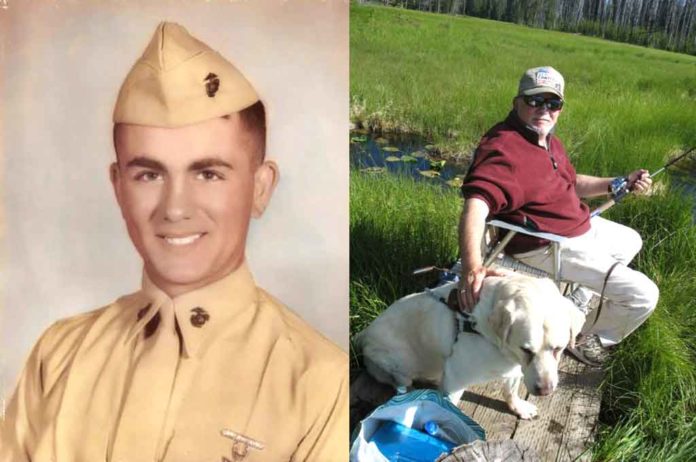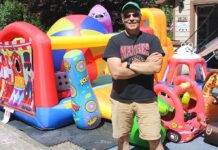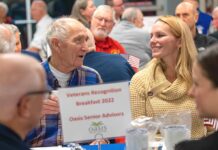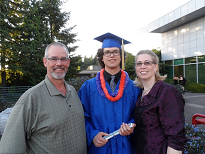
By Dale Potts
Part one of a series.
Harold R. “Hal” Long, who served three tours as a Marine in Vietnam, was known as a talented writer and play director when he lived in Tualatin. Those who worked with him knew he was blind but few knew his condition was caused by Agent Orange from when he was in-country.
Hal grew up in a tough town, Detroit. He joined the military before finishing high school. He figured he needed to get out of the Detroit flow before he got into trouble. He had some minor delinquency in his youth but decided on the Marines after being advised he needed to learn discipline. He had enjoyed John Wayne WWII movies; John Wayne on Wake Island, John Wayne in the Philippines, John Wayne with the Flying Tigers and envisioned himself in those roles – being a hero wasn’t too bad. But the main selling point was the GI bill, getting one year of college money for every year served. In 1959, he signed up for two years in the Marines. His service time was uneventful but he did earn his high school diploma. He then completed two years of college but found continuing school to be very expensive.
Hal bounced around on several different jobs until recruited in 1963 to re-enlist in the Marines for three years and more college money. This time he received intensive combat training. It included a 27-day trek with full gear, i.e a heavy backpack, walking through Death Valley and then scaling the heights of Mount Whitney, the most strenuous accomplishment in his life. He sailed to Vietnam, along with 2700 other Marines, on a troop transport ship that took 37 days. As he recalls, he was seasick, unable to keep food down so spent most of the trip with his head hanging over the side of the ship. Upon arrival, they were assigned as advisers in the Mekong Delta, into four-man teams doing reconnaissance – checking and reporting enemy activity to the South Vietnamese Army, often doing observation from trees. Guns were issued but no bullets. After losing 12 men the first day, ammunition was provided but only for defensive purposes! The Marines found their weapons were not made for jungle warfare – too big and too heavy. Their helmets were too heavy and flack jackets worthless. They discarded every thing they could. After about a week, Hal’s team discovered a cache of Czechoslovakian grease guns which were light and short, much more maneuverable.
Hal described the Mekong Delta as the liquefied portion of Vietnam – rice paddies, very soft earth, a mountainous area, extremely humid with little beasties that clung to you wherever you went. He claimed it was so humid, he could watch rust form on the barrel of his weapon. For the first three months, his team was in the open field where they were provided K-rations, a carryover from WWII. C-rations might have been good at the time for those who received them, but Hal’s team got old crackers and ham and lima beans in tins that Hal felt were probably canned in the ‘40s. Fortunately, their training included how to eat from the land. They knew the topography of the country and what foods grew wild and what were edible, so ate off the jungle.
Hal’s team worked hard to not be discovered while doing reconnaissance. They wanted to stay out of sight. As soon as their location was determined, they were certain to draw enemy fire. They kept moving but drew enemy fire every day, day after day. The constant danger developed into a form of fear. Concern for the people around you. The brotherhood of the three men you worked with in four-man team. Hal said the team was his existence. They were the life, they were the reason he was there. They were the reason he did what he was called to do. The idea was, “This is my brother and I am going to get him through it and he’s going to get me through it. We all survived because we became good at hiding.” Hal maintained contact with the other three of that four-man team after Vietnam. He said “we often jokingly refer to ‘living in the trees’ during that first 18 months.”
Hal said he had no contact with home during his first Vietnam tour. His Commanding Officer in Vietnam ordered everyone to write home so their family would know they were okay. They were not allowed to give any details about what they were doing, just that they were okay. He did write but when he came home on leave, his parents said they had not heard from him for three years. His trip home was disappointing. It infuriated him to see people walking down the street with their heads bobbing up and down. They weren’t marching in step. His former friends were still “growing up.” They didn’t look at the world as he looked at it. They did not understand what was going on in Vietnam because information at that time was very classified. “The motions we made, the maneuvers that we did, the missions we were required to do were only part of our military record and not known by the world.”
Our soldiers found the enemy to be highly organized, well trained and very motivated in what they were doing. The Vietnamese had been in constant battle status since 1945, with the anti-colonial war against the French and then the war of national reunification between the North and South. One of the major problems for Americans was identification. Hal had a total of 18 months of pure combat in his last three tours and never saw an enemy uniform. He said what he saw (to him) “looked like little people in black pajamas with straw hats and you never knew whether they were with you or against you.”
Note: The information in this column came from an 2007 interview of Hal Long by Larry McClure for a Tualatin Historical Society project. Hal’s wife, Lynn Wolf, also contributed. Hal lived in Tualatin from 2001 to 2008 and passed away on July 19, 2015.



















